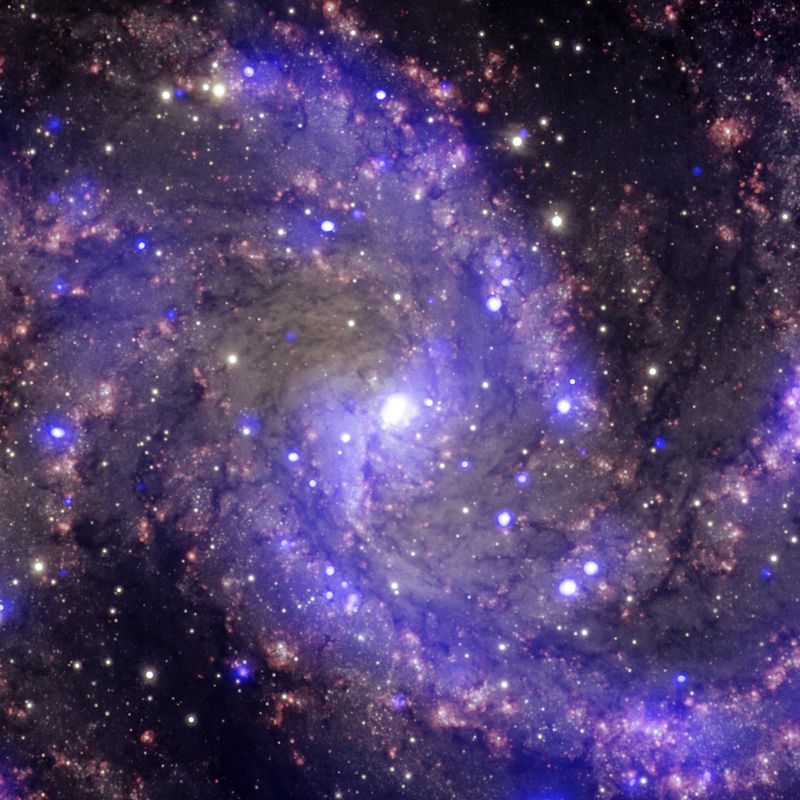Page 1 of 1
New Supernova
Posted: Mon May 22, 2017 9:09 am
by JohnD
Apod's sister website Epod has scooped the discovery of a new supernova by nova hunter Patrick Wiggins of Utah.
SN2017 is in the well named Fireworks Galaxy, NGC 6946, and he found it early in its development, on May 14. No doubt more news about it in due course.
See:
http://epod.usra.edu/ for 22nd May 2017
John
Re: New Supernova
Posted: Mon May 22, 2017 3:34 pm
by neufer
JohnD wrote:
Apod's sister website Epod has scooped the discovery of a new supernova by nova hunter Patrick Wiggins of Utah.
SN2017 is in the well named Fireworks Galaxy, NGC 6946, and he found it early in its development, on May 14. No doubt more news about it in due course.
See:
http://epod.usra.edu/ for 22nd May 2017
- Curses...EPOD again
 Why can't APOD do more pictures of Earth
Why can't APOD do more pictures of Earth 
https://en.wikipedia.org/wiki/NGC_6946 wrote:
<<NGC 6946 (also known as the Fireworks Galaxy, Arp 29, and Caldwell 12) is an intermediate spiral galaxy about 22 million light-years away, in the constellations Cepheus and Cygnus.
In the Catalogue of Named Galaxies, it is called Pyrobolus Cygni, or the firework galaxy, because of the record number of supernovae discovered in it. It was discovered by William Herschel on 9 September 1798. NGC 6946 is highly obscured by interstellar matter of the Milky Way galaxy, as it is quite close to the galactic plane. The diameter of the galaxy is approximately 40,000 light-years or just about a third of the size of the Milky Way.
In the past century, ten supernovae have been observed to explode in the arms of this galaxy, which has been classified as a starburst galaxy: SN 1917A, SN 1939C, SN 1948B, SN 1968D, SN 1969P, SN 1980K, SN 2002hh, SN 2004et, SN 2008S, and SN 2017eaw. This makes it the most prolific known galaxy for this type of event over a period of 100 years. By comparison, the Milky Way galaxy, which has double the number of stars as NGC 6946, averages one supernova event per century. It also contained the failed supernova potential blackhole forming star N6946-BH1.. Chandra Space Telescope observations have, in fact, revealed three of the oldest supernovae ever detected in X-rays.>>
Re: New Supernova
Posted: Mon May 22, 2017 4:12 pm
by bystander
JohnD wrote:
SN2017 is in the well named Fireworks Galaxy, NGC 6946, and he found it early in its development, on May 14. No doubt more news about it in due course.
The actual designation is
SN 2017 eaw. It has been classified as a
type IIP supernova.
More information can be found at
The Astronomer's Telegram and the
Transient Name Server.
Re: New Supernova
Posted: Mon May 22, 2017 4:53 pm
by neufer
https://en.wiktionary.org/wiki/eaw wrote:
eaw: The sound of a donkey; heehaw.
(slang) A sound indicating something is stupid.
Etymology: From the sound; An early known print was in
a 1988 instruction booklet for the video game Zelda II.
Re: New Supernova
Posted: Mon May 22, 2017 5:27 pm
by JohnD
Thank you, all!
"SN 2017 eaw" - gosh, that means it's the 26x5+23rd =153rd supernova found this year!
Or does it? The Wiki only refers to two letter classification, so max of 676 SNs, aa to zz.
(See
https://en.wikipedia.org/wiki/Astronomi ... Supernovae)
But three letter, so 26 times through the two letter code, then a third letter to start again. Is that 26^2 x 23? The 15,548th supernova in 2017
Not such a scoop as I thought.
Elsewhere I find, one per 50 years in an average galaxy, like the Milky Way, but there are a lot out there.#
J
Re: New Supernova
Posted: Mon May 22, 2017 7:13 pm
by neufer
JohnD wrote:
"SN 2017 eaw" - gosh, that means it's the 26x5+23rd =153rd supernova found this year!
Or does it? The Wiki only refers to two letter classification, so max of 676 SNs, aa to zz.
(See
https://en.wikipedia.org/wiki/Astronomi ... Supernovae)
But three letter, so 26 times through the two letter code, then a third letter to start again. Is that 26^2 x 23? The 15,548th supernova in 2017
Not such a scoop as I thought.
Elsewhere I find, one per 50 years in an average galaxy, like the Milky Way, but there are a lot out there.#
The number of automated sky surveys that can detect supernovae has literally exploded:
http://www.rochesterastronomy.org/supernova.html
Re: New Supernova
Posted: Wed May 24, 2017 4:57 am
by Joe Stieber
Just after midnight on May 14, 2017 (EDT), Patrick Wiggins posted a link to the discovery image on the Minor Planet Mailing List, asking the minor planet experts if it might be an asteroid (it wasn't). Later that day, Bob King had a
nice article about it at Sky & Telescope online. I finally got a chance to locate and see SN 2017eaw last Sunday morning, May 21, around 12:45 am EDT from the NJ Pines with a 13.1-inch Newtonian, and was even able to get it with a 4-second snapshot,
currently at the top of my home page (it's a record of the observation, not a lush photo!).
Re: New Supernova
Posted: Wed Aug 02, 2017 12:24 pm
by Knight of Clear Skies
Thanks for the heads up.
Looking on here it's still at about mag 13, so I might have a go at imaging it later this month.
Re: New Supernova
Posted: Mon Oct 09, 2017 7:20 am
by declareself
JohnD wrote:Apod's sister website Epod has scooped the discovery of a new supernova by nova hunter Patrick Wiggins of Utah.
SN2017 is in the well named Fireworks Galaxy, NGC 6946, and he found it early in its development, on May 14. No doubt more news about it in due course.
See:
http://epod.usra.edu/ for 22nd May 2017
John
This is just amazing!
